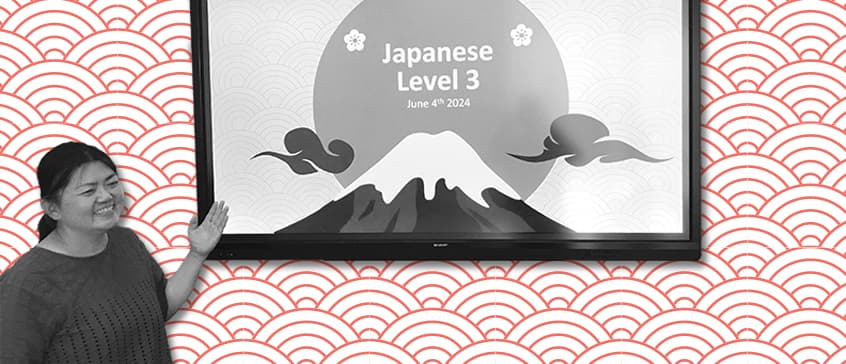A Cultural Journey of Learning Japanese

By Portia Yip, Marketing Services
"Language is a reflection of a culture, and its traditions or values," says Nozomi Franco Cea, a Japanese language instructor with Continuing Studies at UVic.
Nozomi is passionate about teaching and supporting students. With a background in education and psychology, she worked as an elementary school teacher in Japan before moving to Canada in 2004. She further pursued studies in youth education and has a master’s degree from the University of British Columbia and a PhD from UVic.
For nearly a decade, Nozomi has been teaching children at the Japanese Language School in Victoria, as well as all three levels of Japanese with Continuing Studies at UVic.
"People have different reasons for taking language courses," she says. "Some focus more on basic or survival language skills if they are planning to go to Japan soon, and other students are interested in learning to read, write or eventually master the whole language."
In her classes, there’s a mix of students with different motivations. From adults who want to visit friends or relatives living in Japan, to younger students inspired by Japanese pop culture, learning a new language is possible at any time.
"Sometimes we just need a little push to start new things," Nozomi says. "The Continuing Studies courses are great for learning at your own pace."
Understanding a new language takes time, practice and building confidence. During Nozomi’s classes, students engage in cultural activities like origami, trying Japanese snacks and celebrating traditional holidays or seasonal events.
The classroom also acts as a gathering space for like-minded individuals where they can share their interests and reasons for studying Japanese. Some learners are there because they want to expand their knowledge of Japanese to talk to their grandchildren in Japan, while others host exchange students and wish to learn their language.
"They want to make the student feel welcome so they’re interested in learning Japanese, Korean, or the native language of the student they are hosting," Nozomi describes.
Despite the many online resources shared with students to support their reading and writing skills, finding opportunities for conversational practice can be more challenging. To overcome this, students may form practice groups outside of class to improve their speaking skills.
"What students are looking for, or sometimes missing, is the speaking practice or having a place to have conversations," Nozomi explains. "If you’re interested in not just the language but culture as well, I encourage people to explore cultural groups in Victoria."
Local organizations like the Victoria Nikkei Cultural Society or the Victoria Japanese Friendship Society offer events and opportunities to meet others and discover more about Japan. UVic’s Cinecenta also screens international movies, including Japanese films and anime.
Even though it’s important to understand the pronunciations or characters in the Japanese language system, making new connections and having fun is part of the learning journey too.
In Nozomi’s multilingual family—where Japanese, Spanish and English are spoken in her home—she understands the excitement and difficulties of learning a second, third or even fourth language. Her advice for students who are starting, continuing or advancing their Japanese language skills?
"Don’t be discouraged if you can’t memorize certain words. Being imperfect is a great start."
- Posted August 1, 2024
RELATED TOPICS: World Languages
Visit Registration
2nd Floor | Continuing Studies Building University of Victoria Campus 3800 Finnerty Road | Victoria BC | CanadaTel 250-472-4747 | Email uvcsreg@uvic.ca
2025 © Continuing Studies at UVic
Legal Notices |
Sitemap

